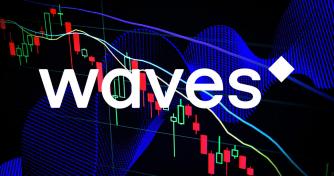 An NFT just sold for $1 million on the Waves blockchain
An NFT just sold for $1 million on the Waves blockchain An NFT just sold for $1 million on the Waves blockchain
The sale is the biggest NFT purchase outside of the Ethereum ecosystem.

Cover art/illustration via CryptoSlate. Image includes combined content which may include AI-generated content.
Waves.tech, an ecosystem of next-generation technologies built on blockchain toolkit Waves, has concluded the highest sale of a non-fungible token (NFT) outside of Ethereum, it said in a release shared with CryptoSlate.
https://t.co/e2SzIZnfY5 #NFT $waves
— Sasha Ivanov (@sasha35625) April 15, 2021
NFT frenzy continues
A Waves Duck called “Perfection” sold for 1,000,000 Neutrino Dollar (USDN) on SIGN Art, a web gallery for blockchain-certified digital art. To celebrate the sale, the team has released its roadmap for a series of NFT gamification initiatives coupled with DeFi yield farming mechanics on the Waves ecosystem.
Created in 2018, SIGN Art is the first NFT marketplace on the Waves blockchain and currently features over 170 artists with a total of 1245 drops and 627 sales. Minting on SIGN Art is free, and the publishing fee is $1 per edition, which can be unique releases or in sets of ten.
NFTs are blockchain-based representations of tangible or non-tangible assets that prove their holder is the true owner of that underlying asset. These are immutable and non-replicable and can range from digital collectibles to crypto art, to real estate.
Perfection is the only NFT created in a series of one by Sasha Ivanov, founder of Waves. It received over 40 bids in an uncapped auction model before selling for 1,000,000 $USDN (Waves Neutrino Stablecoin).
To date, the Waves Duck sale is the highest NFT sale outside of Ethereum, beating the “2019-20 LeBron James dunk,” which sold for $208,000 on NBA Topshot, and Bitcoin Origin’s “4MB Block (M2),” which sold for $345,300 on Atomic Hub.
Why Waves
In a statement, Ivanov said that all profits from the NFT sale will be used towards buybacks of NFT duck packs that will be built by Hunters through the Duck Hunters games.
“This week we celebrated Waves 5th anniversary and we took this opportunity to give back to our community for their continuous support and enthusiasm towards Waves tech,” said Ivanov.
NFTs originated on the Ethereum blockchain, but amidst growth in popularity for the coveted digital assets and increasing costs on Ethereum, many pioneering blockchain protocols have launched their own NFTs and marketplaces including Flow, EOS, Waves, Tron, and more.
“On Waves, all transactions are instant and we have low-fixed transaction fees, which makes it a perfect playground for NFTs innovations,” explained Ivanov about the appeal of lower-cost blockchains for NFTs.
Meanwhile, it’s not the NFTs sector that Waves is disrupting. The company has made inroads into the DeFi space through the Neutrino protocol, an infrastructure for plug-and-play algorithmic finance and its native interest-bearing stablecoin USDN, governance staking token NSBT, and Swop.fi, an automated market maker built on Waves.


 CoinGlass
CoinGlass 

























































































 WAVES
WAVES